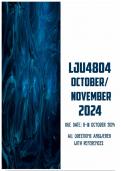, PLEASE USE THIS DOCUMENT AS A GUIDE TO ANSWER YOUR ASSIGNMENT
Please note that the author of this document will not responsibility for any plagiarizing you
commit.
Question 1
1. Read the set of facts below and answer the questions that follow.
John and Mary Smith got married in Hawaii in December 1983. At that time, they were British citizens
and Mary was domiciled in London, while John was working in New York on a two-year fixed term
contract with the possibility of further renewal. However, just before the marriage, John was offered a
very senior permanent position with a South African retail brand and he had entered into negotiations
with the company at that stage.
They relocated to Johannesburg, South Africa shortly after getting married and established a domicile
there. Two children were born from the marriage and Mary stayed at home to look after them
full-time.
In 2022, Mary filed for divorce in the South Gauteng High Court. She also applied for a redistribution
of assets.
1.1. Which legal system applies to the formal validity of John and Mary’s marriage in terms of
the South African rules of private international law?
The legal system that applies to the formal validity of John and Mary's marriage, based on South
African rules of private international law, is the law of the place where the marriage was celebrated
(lex loci celebrationis). Since John and Mary were married in Hawaii, the formal validity of their
marriage will be governed by Hawaiian law. This follows the general principle in South African
private international law that the lex loci celebrationis governs the formal validity of a marriage.
(Study Guide - Page: 68)
1.2. How would the South African court determine where John was domiciled at the time of
entering into the marriage? Note: The court must determine where he was domiciled in
December 1983.
To determine where John was domiciled at the time of entering into the marriage in December 1983,
the South African court would follow the rules of South African private international law and apply
the common law rules on domicile, since the Domicile Act of 1992 does not apply retroactively.
Common Law Rules on Domicile
At the time, South African law recognized three types of domicile under common law:
Domicile of origin: Acquired at birth.
Domicile of choice: Acquired when a person legally resides in a place with the intention to
remain there permanently.
Domicile of dependence: Applied to persons lacking legal capacity, such as minors.
, Steps for Determining John’s Domicile
John’s Domicile of Origin:
John’s domicile of origin was likely the UK, based on the assumption that he was born there
and his father was domiciled there at the time of his birth.
John’s Domicile of Choice:
For John to have a domicile of choice, he must be lawfully present in a country with the
intention of settling there permanently.
At the time of the marriage, John was working in New York on a two-year contract, which was
temporary in nature, with a possibility of renewal. This fact suggests that he may not have had
the intention to settle permanently in the US, making it unlikely that he had established a
domicile of choice there.
He was also negotiating for a permanent position in South Africa, but no agreement had been
reached yet. Therefore, his future plans regarding South Africa were still uncertain in
December 1983.
Domicile of Dependence:
This category does not apply to John, as he was an adult with full legal capacity at the time.
Conclusion
Given the facts, it is likely that John’s domicile of origin in the UK would be considered his domicile
at the time of the marriage, as he had not yet established a clear domicile of choice in either the US
or South Africa. However, the court would carefully consider all relevant facts, such as his intent
during his time in New York and his ongoing negotiations with the South African company, before
making a final determination.
(Study Guide - Page: 62)
1.3. Mary’s legal counsel would like to argue that the proprietary consequences of the parties’
marriage are governed by South African law as the intended matrimonial domicile when the
parties got married. Advise her legal team on their prospects of success considering relevant case
law. Your answer must include a properly referenced, full case discussion of Sadiku v Sadiku
30498/06 (unreported) as well as the relevant points in this regard from the prescribed article by
Neels and Wethmar-Lemmer 2008 TSAR 587 – 596.
Mary’s legal counsel seeks to argue that the proprietary consequences of her marriage are governed
by South African law as the intended matrimonial domicile at the time of the marriage. In addressing
the prospects of success for this argument, it is essential to examine the current South African legal
framework governing the proprietary consequences of marriage and how courts have traditionally
approached the concept of "intended matrimonial domicile." The common law position, key case law
(including Sadiku v Sadiku 30498/06), and academic commentary, particularly the critical analysis
provided by Neels and Wethmar-Lemmer (2008 TSAR 587-596), will be considered.
The Doctrine of Immutability and the Lex Domicilii Matrimonii
In South African private international law, the proprietary consequences of marriage are governed by
the doctrine of immutability, which holds that the matrimonial domicile remains fixed at the time of
marriage, irrespective of subsequent changes in the parties’ domicile. The general rule is that
proprietary consequences of marriage are governed by the law of the matrimonial domicile (lex
domicilii matrimonii), and traditionally, the husband’s domicile at the time of marriage determines
this legal framework.




